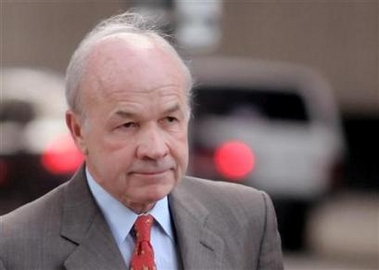Enron Corp.'s founder Ken Lay died of heart disease on Wednesday while
vacationing near Aspen, Colo., six weeks after being convicted of fraud and
conspiracy in the financial scandal that brought down the once-mighty energy
conglomerate.

Enron founder Ken Lay
as he makes his way to the Federal court in Houston, April 13, 2006. Lay,
who was convicted last month of fraud and conspiracy for his part in the
Houston-based company's collapse, has died of a heart attack at his
vacation home in Colorado, a Houston television station reported on
Wednesday. [Reuters] |
Lay, 64, who was awaiting sentencing, faced decades in prison in connection
with Enron's 2001 bankruptcy.
"There was no evidence of foul play," Dr. Rob Kurtzman, the forensic
pathologist who performed the autopsy told reporters in Grand Junction,
Colorado.
"The cause of death is coronary artery disease," he said, adding that the
post mortem showed that Lay had previously suffered a heart attack.
Lay and another former Enron chief executive, Jeffrey Skilling, were found
guilty of hiding the financial ruin at Enron, the company they built into the
seventh largest in the United States.
Once a confidant of former President George H.W. Bush and dubbed "Kenny boy"
by President George W. Bush, Lay often appeared fatigued during the four-month
trial. At one point, he told the jury from the witness stand: "I guess you could
say in the last few years I've achieved the American nightmare."
Skilling was not available for comment, although his lawyer Daniel Petrocelli
said the former protege of Lay was deeply saddened by Lay's death.
"He's distraught over Ken's passing," Petrocelli said. "He was a very good
friend and a good colleague."
In Washington, White House spokesman Tony Snow said he had not spoken to Bush
about Lay's death, but distanced the president from the former Enron chief who
was once a major contributor to the Bushes' political campaigns.
"The president has described Ken Lay as an acquaintance, and many of the
president's acquaintances have passed on during his time in office," Snow told
reporters.
At the Enron offices in Houston, where a small crew of workers was selling
off the company's assets to pay creditors, Enron Corp. spokesman Harlan Loeb
said: "We extend our sympathies to the Lay family in this time of sadness."
Pitkin County sheriff's deputies and an ambulance were called to the Lay
vacation home in Old Snowmass, Colorado, early on Wednesday morning. Lay was
taken to Aspen Valley Hospital where he was pronounced dead shortly after 3 a.m.
Mountain time (0900 GMT).
The pastor at the Houston church attended by Lay and his family said he was
stunned by Lay's death. "The family called early this morning to say that he had
died last night," said Dr. Steve Wende, pastor of First Methodist Church of
Houston.
Lay had attended church there on the previous Sunday.
"He looked good. He was with people. He had family there ... he looked
healthy," Wende said.
On Friday, federal prosecutors asked a federal judge to force Lay to forfeit
$43.5 million they said he had received because of his crimes at Enron.
A spokesman at the Department of Justice declined to comment on Lay's death
and said prosecutors would release a statement in the coming days on how they
would proceed with the claims for the money.
Lay and Skilling had maintained their innocence, and planned to appeal the
guilty verdicts.
Lay, whose wealth once totaled more than $100 million, claimed he had little
money after Enron's bankruptcy, although prosecutors have said he had millions
in annuities and other investments.
Born into poverty as the son of a Baptist preacher in Missouri, Lay excelled
in school and advanced quickly in the worlds of government and business before
taking the helm of the company that would become Enron.
Enron began as a small pipeline operation in 1985 and under Lay's guidance it
rapidly grew into an international energy powerhouse.
During Enron's glory days, Lay basked in Houston's limelight and was a
fixture on the charity circuit, donating millions of his own money and Enron's
funds.
After his indictment, Lay was usually only seen in public on Sunday mornings
for church services.
Another Enron executive, Cliff Baxter, a close confidant of Skilling,
committed suicide weeks after Enron's bankruptcy.
Lay is survived by his wife, Linda, five children and step-children and 12
grandchildren. Information on funeral arrangements had not yet been announced by
early Wednesday evening.